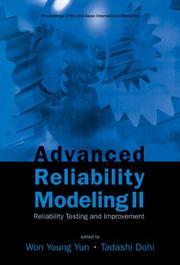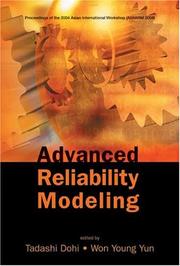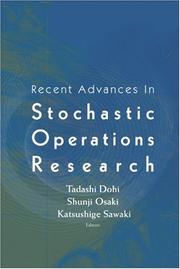| Listing 1 - 10 of 13 | << page >> |
Sort by
|
Book
ISBN: 3036537996 3036538003 Year: 2022 Publisher: MDPI - Multidisciplinary Digital Publishing Institute
Abstract | Keywords | Export | Availability | Bookmark
 Loading...
Loading...Choose an application
- Reference Manager
- EndNote
- RefWorks (Direct export to RefWorks)
Book
ISBN: 1447161823 144714970X 1447149718 Year: 2013 Publisher: Hoboken, N.J. : Springer,
Abstract | Keywords | Export | Availability | Bookmark
 Loading...
Loading...Choose an application
- Reference Manager
- EndNote
- RefWorks (Direct export to RefWorks)
In honor of the work of Professor Shunji Osaki, Stochastic Reliability and Maintenance Modeling provides a comprehensive study of the legacy of and ongoing research in stochastic reliability and maintenance modeling. Including associated application areas such as dependable computing, performance evaluation, software engineering, communication engineering, distinguished researchers review and build on the contributions over the last four decades by Professor Shunji Osaki. Fundamental yet significant research results are presented and discussed clearly alongside new ideas and topics on stochastic reliability and maintenance modeling to inspire future research. Across 15 chapters readers gain the knowledge and understanding to apply reliability and maintenance theory to computer and communication systems. Stochastic Reliability and Maintenance Modeling is ideal for graduate students and researchers in reliability engineering, and workers, managers and engineers engaged in computer, maintenance and management works.
Operations research -- Mathematical models -- Congresses. --- Reliability (Engineering) -- Mathematical models -- Congresses. --- Stochastic models -- Congresses. --- Engineering & Applied Sciences --- Chemical & Materials Engineering --- Mechanical Engineering --- Technology - General --- Materials Science --- Industrial & Management Engineering --- Stochastic analysis. --- Osaki, Shunji. --- Analysis, Stochastic --- Osaki, S. --- Ozaki, Shunji --- Engineering. --- Mathematical statistics. --- Statistics. --- Quality control. --- Reliability. --- Industrial safety. --- Quality Control, Reliability, Safety and Risk. --- Probability and Statistics in Computer Science. --- Statistics for Engineering, Physics, Computer Science, Chemistry and Earth Sciences. --- Mathematical analysis --- Stochastic processes --- System safety. --- Computer science. --- Informatics --- Science --- Safety, System --- Safety of systems --- Systems safety --- Accidents --- Industrial safety --- Systems engineering --- Statistical analysis --- Statistical data --- Statistical methods --- Statistical science --- Mathematics --- Econometrics --- Prevention --- Statistics . --- Statistical inference --- Statistics, Mathematical --- Statistics --- Probabilities --- Sampling (Statistics) --- Industrial accidents --- Industries --- Job safety --- Occupational hazards, Prevention of --- Occupational health and safety --- Occupational safety and health --- Prevention of industrial accidents --- Prevention of occupational hazards --- Safety, Industrial --- Safety engineering --- Safety measures --- Safety of workers --- System safety --- Dependability --- Trustworthiness --- Conduct of life --- Factory management --- Industrial engineering --- Reliability (Engineering) --- Standardization --- Quality assurance --- Quality of products --- Maintainability (Engineering) --- Stochastic processes. --- Statistical methods. --- Mathematical models.
Digital
ISBN: 9781447149712 Year: 2013 Publisher: London Springer
Abstract | Keywords | Export | Availability | Bookmark
 Loading...
Loading...Choose an application
- Reference Manager
- EndNote
- RefWorks (Direct export to RefWorks)
In honor of the work of Professor Shunji Osaki, Stochastic Reliability and Maintenance Modeling provides a comprehensive study of the legacy of and ongoing research in stochastic reliability and maintenance modeling. Including associated application areas such as dependable computing, performance evaluation, software engineering, communication engineering, distinguished researchers review and build on the contributions over the last four decades by Professor Shunji Osaki. Fundamental yet significant research results are presented and discussed clearly alongside new ideas and topics on stochastic reliability and maintenance modeling to inspire future research. Across 15 chapters readers gain the knowledge and understanding to apply reliability and maintenance theory to computer and communication systems. Stochastic Reliability and Maintenance Modeling is ideal for graduate students and researchers in reliability engineering, and workers, managers and engineers engaged in computer, maintenance and management works.
Statistical science --- Operational research. Game theory --- Applied physical engineering --- Production management --- Computer science --- stochastische analyse --- computers --- informatietechnologie --- kwaliteitscontrole --- ingenieurswetenschappen --- computerkunde --- statistisch onderzoek
Book
Year: 2022 Publisher: Basel MDPI - Multidisciplinary Digital Publishing Institute
Abstract | Keywords | Export | Availability | Bookmark
 Loading...
Loading...Choose an application
- Reference Manager
- EndNote
- RefWorks (Direct export to RefWorks)
This monograph concerns the mathematical aspects of software reliability and quality assurance and consists of 11 technical papers in this emerging area. Included are the latest research results related to formal methods and design, automatic software testing, software verification and validation, coalgebra theory, automata theory, hybrid system and software reliability modeling and assessment.
Technology: general issues --- History of engineering & technology --- fuzzy automata --- coalgebra --- fuzzy language --- bisimulation --- composition --- test data generation --- genetic algorithm --- specification-based testing --- regression testing --- mutation testing --- eventual property --- model checking --- Maude --- textual question answering --- visual question answering --- metamorphic testing --- metamorphic relations --- quality assessment --- software rejuvenation --- checkpointing --- optimal rejuvenation-trigger timing --- steady-state system availability --- phase expansion --- human-error factors --- petri net --- concurrent software systems --- model-checking --- data-flows --- software reliability model --- maximum likelihood estimation --- EM algorithm --- non-homogeneous Poisson process --- generalized failure count data --- moth flame optimization --- island-based model --- feature selection --- software defect prediction --- software reliability --- search-based test case generation --- branch coverage --- object-oriented --- deep learning --- long short-term memory --- project similarity and clustering --- cross-project prediction --- Nervos CKB --- consensus protocol --- UPPAAL
Book
ISBN: 1003337074 1003337074 1000793966 877022109X 9788770221092 Year: 2019 Publisher: Gistrup, Denmark ; Delft, The Netherlands : River Publishers,
Abstract | Keywords | Export | Availability | Bookmark
 Loading...
Loading...Choose an application
- Reference Manager
- EndNote
- RefWorks (Direct export to RefWorks)
In recent years, applied mathematics has been used in all novel disciplines of scientific development. Advances in Applied Mathematical Problems summarizes interdisciplinary work within the field of applied mathematics. The topics discussed in the book include: Similarity Solutions of Spherical Shock Waves in a Self-Gravitating Ideal Gas Dual Solutions for Finite Element Analysis of Unsteady Hydromagnetic Stagnation Point Flow of Cu-Water Nanofluid Generated by Stretching Sheet Multiparametric modeling of carbon cycle in temperate wetlands for regional climate change analysis using satellite data An Intelligent Neuro Fuzzy System for Pattern Classification Fuzzy inventory model with demand, deterioration and inflation: a comparative study through NGTFN and CNTFN Summability and its application for the stability of the system Design Of Manufacturing, Control, And Automation Systems SEIR - Application for Crop through Water and Soil Texture Advances in radial basis functions Modeling For Time Period Of Natural Frequency For Non-Homogeneous Square Plate With Variable Thickness And Temperature Effect A Study On Metric Fixed Point Theorems Satisfying Integral Type Contractions Objective Function - In Radiometric Studies -Application to Agrs Surveys Associated With Radon Modelling Kernel Function in Black body Radiation Inversion.
Book
Year: 2022 Publisher: Basel MDPI - Multidisciplinary Digital Publishing Institute
Abstract | Keywords | Export | Availability | Bookmark
 Loading...
Loading...Choose an application
- Reference Manager
- EndNote
- RefWorks (Direct export to RefWorks)
This monograph concerns the mathematical aspects of software reliability and quality assurance and consists of 11 technical papers in this emerging area. Included are the latest research results related to formal methods and design, automatic software testing, software verification and validation, coalgebra theory, automata theory, hybrid system and software reliability modeling and assessment.
fuzzy automata --- coalgebra --- fuzzy language --- bisimulation --- composition --- test data generation --- genetic algorithm --- specification-based testing --- regression testing --- mutation testing --- eventual property --- model checking --- Maude --- textual question answering --- visual question answering --- metamorphic testing --- metamorphic relations --- quality assessment --- software rejuvenation --- checkpointing --- optimal rejuvenation-trigger timing --- steady-state system availability --- phase expansion --- human-error factors --- petri net --- concurrent software systems --- model-checking --- data-flows --- software reliability model --- maximum likelihood estimation --- EM algorithm --- non-homogeneous Poisson process --- generalized failure count data --- moth flame optimization --- island-based model --- feature selection --- software defect prediction --- software reliability --- search-based test case generation --- branch coverage --- object-oriented --- deep learning --- long short-term memory --- project similarity and clustering --- cross-project prediction --- Nervos CKB --- consensus protocol --- UPPAAL
Book
Year: 2022 Publisher: Basel MDPI - Multidisciplinary Digital Publishing Institute
Abstract | Keywords | Export | Availability | Bookmark
 Loading...
Loading...Choose an application
- Reference Manager
- EndNote
- RefWorks (Direct export to RefWorks)
This monograph concerns the mathematical aspects of software reliability and quality assurance and consists of 11 technical papers in this emerging area. Included are the latest research results related to formal methods and design, automatic software testing, software verification and validation, coalgebra theory, automata theory, hybrid system and software reliability modeling and assessment.
Technology: general issues --- History of engineering & technology --- fuzzy automata --- coalgebra --- fuzzy language --- bisimulation --- composition --- test data generation --- genetic algorithm --- specification-based testing --- regression testing --- mutation testing --- eventual property --- model checking --- Maude --- textual question answering --- visual question answering --- metamorphic testing --- metamorphic relations --- quality assessment --- software rejuvenation --- checkpointing --- optimal rejuvenation-trigger timing --- steady-state system availability --- phase expansion --- human-error factors --- petri net --- concurrent software systems --- model-checking --- data-flows --- software reliability model --- maximum likelihood estimation --- EM algorithm --- non-homogeneous Poisson process --- generalized failure count data --- moth flame optimization --- island-based model --- feature selection --- software defect prediction --- software reliability --- search-based test case generation --- branch coverage --- object-oriented --- deep learning --- long short-term memory --- project similarity and clustering --- cross-project prediction --- Nervos CKB --- consensus protocol --- UPPAAL --- fuzzy automata --- coalgebra --- fuzzy language --- bisimulation --- composition --- test data generation --- genetic algorithm --- specification-based testing --- regression testing --- mutation testing --- eventual property --- model checking --- Maude --- textual question answering --- visual question answering --- metamorphic testing --- metamorphic relations --- quality assessment --- software rejuvenation --- checkpointing --- optimal rejuvenation-trigger timing --- steady-state system availability --- phase expansion --- human-error factors --- petri net --- concurrent software systems --- model-checking --- data-flows --- software reliability model --- maximum likelihood estimation --- EM algorithm --- non-homogeneous Poisson process --- generalized failure count data --- moth flame optimization --- island-based model --- feature selection --- software defect prediction --- software reliability --- search-based test case generation --- branch coverage --- object-oriented --- deep learning --- long short-term memory --- project similarity and clustering --- cross-project prediction --- Nervos CKB --- consensus protocol --- UPPAAL

ISBN: 1281379190 9786611379193 9812773762 9789812773760 9789812567581 9812567585 Year: 2006 Publisher: New Jersey World Scientific
Abstract | Keywords | Export | Availability | Bookmark
 Loading...
Loading...Choose an application
- Reference Manager
- EndNote
- RefWorks (Direct export to RefWorks)
Reliability (Engineering) --- Computer networks --- Reliability of equipment --- Systems reliability --- Engineering --- Maintainability (Engineering) --- Probabilities --- Systems engineering --- Plant performance --- Safety factor in engineering --- Structural failures --- Mathematical models --- Reliability

ISBN: 1281898716 9786611898717 9812702687 9789812702685 9812388710 Year: 2004 Publisher: Singapore Hackensack, NJ World Scientific
Abstract | Keywords | Export | Availability | Bookmark
 Loading...
Loading...Choose an application
- Reference Manager
- EndNote
- RefWorks (Direct export to RefWorks)
The 2004 Asian International Workshop on Advanced Reliability Modeling is a symposium for the dissemination of state-of-the-art research and the presentation of practice in reliability engineering and related issues in Asia. It brings together researchers, scientists and practitioners from Asian countries to discuss the state of research and practice in dealing with reliability issues at the system design (modeling) level, and to jointly formulate an agenda for future research in this engineering area. The proceedings cover all the key topics in reliability, maintainability and safety engineer
Reliability (Engineering) --- Computer networks --- Reliability of equipment --- Systems reliability --- Engineering --- Maintainability (Engineering) --- Probabilities --- Systems engineering --- Plant performance --- Safety factor in engineering --- Structural failures --- Mathematical models --- Reliability --- Advanced reliability modeling --- AIWARM

ISBN: 9812567046 9786611120849 1281120847 9812706682 9789812706683 9789812567048 Year: 2007 Publisher: New Jersey World Scientific
Abstract | Keywords | Export | Availability | Bookmark
 Loading...
Loading...Choose an application
- Reference Manager
- EndNote
- RefWorks (Direct export to RefWorks)
Operations research uses quantitative models to analyze and predict the behavior of systems and to provide information for decision makers. Two key concepts in operations research are optimization and uncertainty. This volume consists of a collection of peer reviewed papers from the International Workshop on Recent Advances in Stochastic Operations Research (RASOR 2005), August 25-26, 2005, Canmore, Alberta, Canada. In particular, the book focusses on models in stochastic operations research, including queueing models, inventory models, financial engineering models, reliability models, and sim
Stochastic models. --- Stochastic models --- Operations research --- Mathematical Statistics --- Mathematics --- Physical Sciences & Mathematics --- Mathematical models --- Operational analysis --- Operational research --- Models, Stochastic --- Industrial engineering --- Management science --- Research --- System theory
| Listing 1 - 10 of 13 | << page >> |
Sort by
|

 Search
Search Feedback
Feedback About UniCat
About UniCat  Help
Help News
News